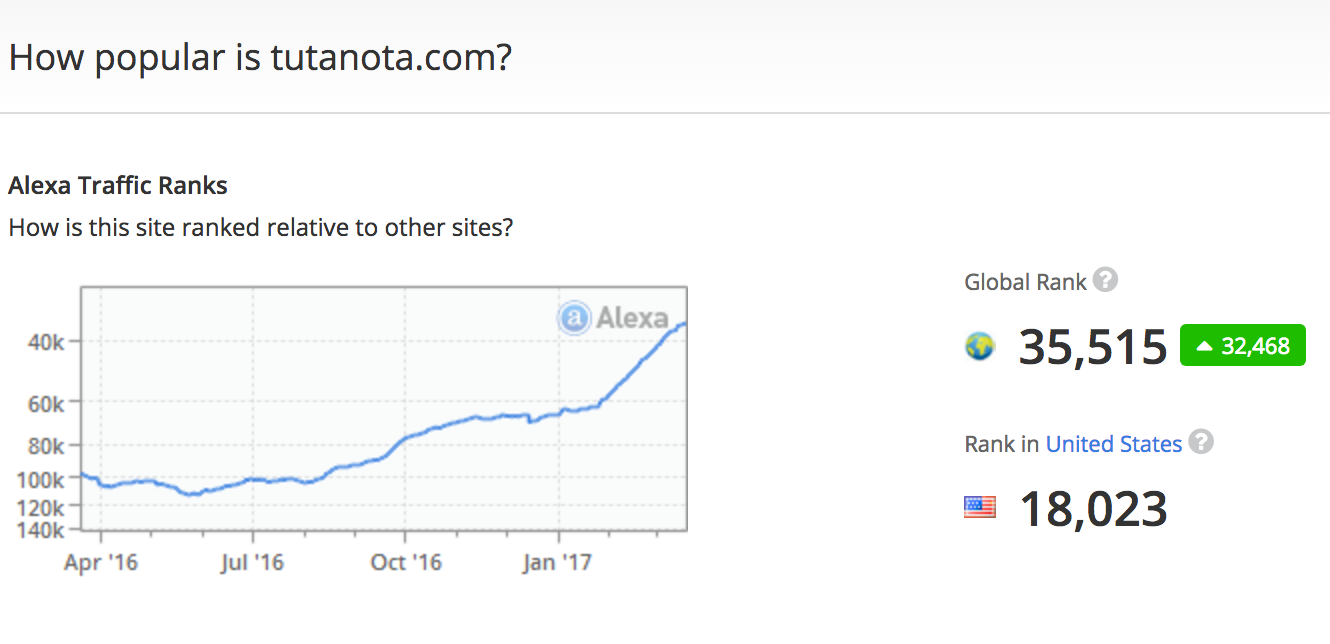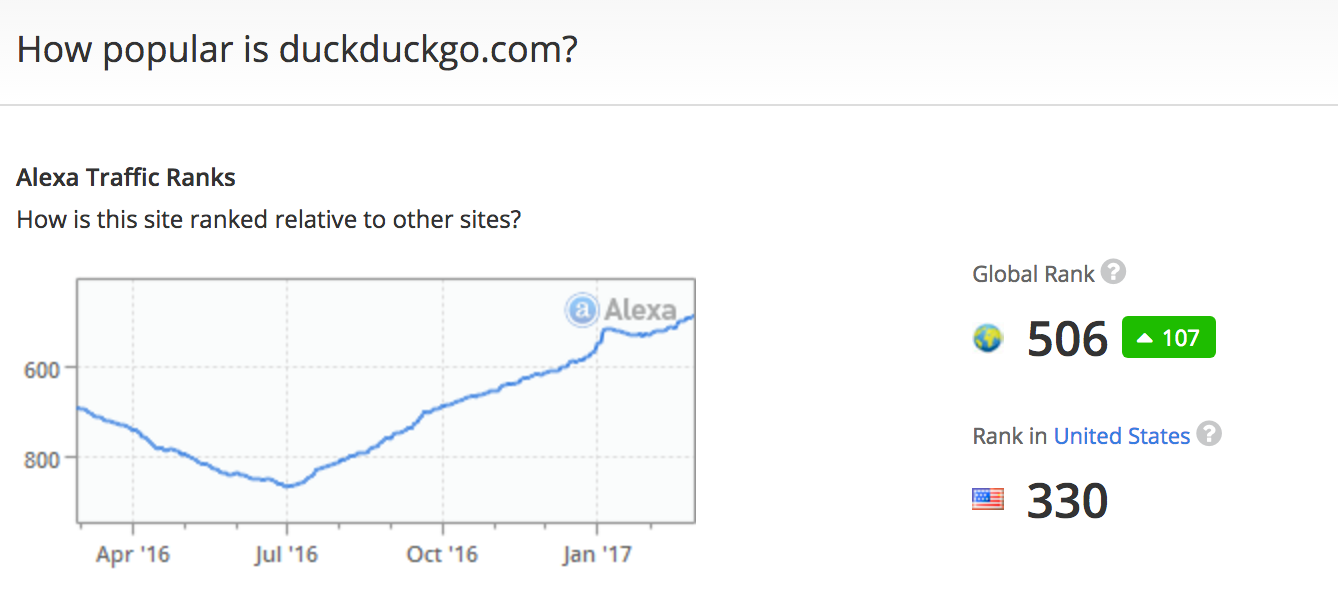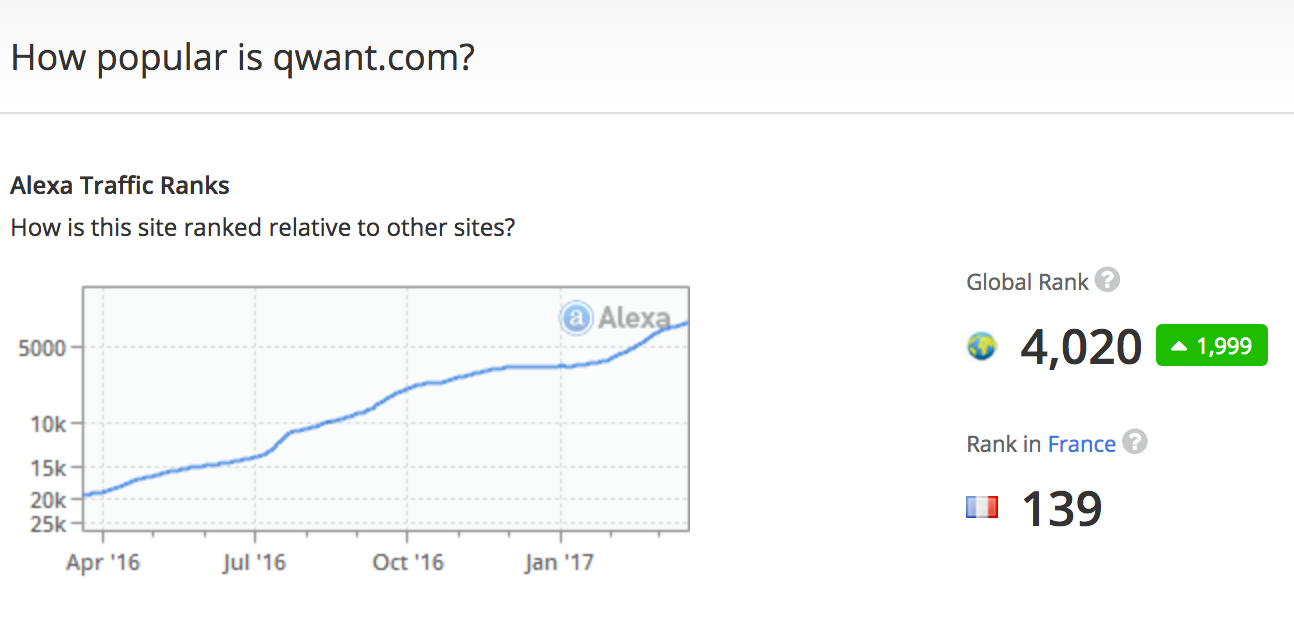2017 Will Be Great: It Is the Start of the Privacy-Era.
Data from Alexa Page Rank impressively shows the turn towards privacy-focused services: Not only has the secure email service Tutanota gained around 32.000 page ranks over the past two months, also search engines like Duckduckgo and Qwant have gained traffic.


Privacy-focused search engines are also on the rise
Duckduckgo and Qwant have gained more than one hundred and one thousand page ranks respectively.




”Traditional” mail services won’t keep people secure
With each new law of data retention, with each new scandal about wiretapping of the general public, with each new scandal about data infringements in non-encrypted email services, people increasingly understand that traditional mail services can’t keep them safe - even if they wanted to. The sheer amount of data, these services have - just remember that Gmail launched in 2004 already - makes them very attractive for anyone wanting access to your data.
If the data a mail provider holds is not encrypted, it can easily be accessed by secret services and other state agencies. The latest Yahoo scandal just shows how easily state agencies can get access to the mail content of everybody using such a service.
In addition to state surveillance, people more and more distrust that traditional online services are interested in keeping their data secure. Boston Consulting estimates that this attitude of distrust will only grow as more and more data breaches become public. The latest - most famous one - was the Yahoo hack that became public in December 2016. Mail addresses and passwords acquired by this hack are now being sold on the Dark Web.
More and more people start using secure mail and search
The turn towards privacy-friendly services was about time as online surveillance around the world is constantly growing. In addition - and the main reason why so many people are making the switch right now - a new, a very disturbing trend is entering mainstream politics of late: Autocratic tendencies.
Following the examples of Russia, Hungary and Turkey, which all have developed from fairly stable democracies into autocratic systems with no free press, now also Western democracies are facing a very similar trend: that right-wing extremists are putting their objectives on the agenda.
The threat that this trend might one day turn any Western democracy into a real autocratic system is currently only looming above our heads, but people are increasingly taking precautions by using privacy-friendly services such as Tutanota and Qwant, and rightly so.
Autocratic and nationalist tendencies increase in democracies
There are already voices fearing that Trump might want to turn the US into an autocratic system similar to Russia. Of course no-one knows if this is truly Trump’s intention, however, it is worrying when an elected President declares a fight against the media. Because let’s face it: Freedom of the press is closely linked to a functioning democracy. Who, but the press, can hold the ruling class into account for their doing?
However, the US is only one example: In France the right-wing extremist Marine LePen has a lot of support and might win the next presidential election. This is particularly worrying as France is also playing with the idea of undermining end-to-end encryption. In Austria nationalist Norbert Hofer only slightly lost the presidential election. And also in Germany the right-wing party AfD has more support than any right-wing party in Germany ever had since WWII.
At the same time - and this should truly worry every citizen, independent of politics - general surveillance online has steadily increased in almost every democratic country.
The surveillance state is already here
Since the Snowden leaks in summer 2013 everybody knows that state agencies can spy on their phone calls, their emails, their every move online. And legislation has only become worse since then. Last autumn the UK government passed the most extreme surveillance law in a democracy. Last September the Swiss have voted in favour of a new surveillance bill.
Now Trump wants to renew its spy law without telling the Congress how many Americans are being spied on. Unfortunately, Germany is not much better than the rest, having just passed a data retention law last October. Fortunately for Tutanota, mail services have been excluded and do not have to retain any communication data. And these laws are just a few examples.
Encryption is the best tool to secure one’s mail
”Our emails contain a lot of sensitive personal data: Communication with banks and state agencies, appointments, services we subscribe to, private communications with friends and family”, says Matthias Pfau, co-founder of Tutanota. “It is crucial that this information cannot be abused - neither by attackers, nor by the authorities nor by the mail service (ie Gmail, Yahoo, Outlook.com) that hosts your mails. That’s why we need end-to-end encryption. This way no-one can spy on our data, and people are increasingly understanding this."
"Our users say, they are sick of all this online spying that is going on. They are also sick of being constantly exposed to targeted advertisements. That’s why they appreciate a secure mail service like Tutanota so much. That’s also why they use privacy-focused search engines like Duckduckgo and Qwant.”
On top of that, a European search index could help us break free from Google and the likes.
Today more and more people understand that their personal information is valuable: If you don’t pay with money, you are paying with your personal life, with every information about yourself that is accessible online. And people don’t want to pay with their personal lives anymore.
”That’s why our user base is growing so quickly”, says Matthias Pfau. “Today all webmail services are very similar in their ease of use. But people are starting to pay attention to the details, and the most important detail with email is privacy. The mail service of the future must respect people’s right to privacy. We fight for our users and their right to privacy because we believe that privacy is a fundamental human right that needs to be protected. Many of our users around the world are journalists, activists and politicians fighting for digital rights. For them - and for anybody else - end-to-end encryption is the best tool to secure one’s mail so that all data stays private."
"We are very happy that more than three years after the Snowden leaks, the privacy-era has finally started! With more and more people using encrypted and privacy-focused services we can protect what belongs to us: our data. This way we will turn the internet into a better place.”

